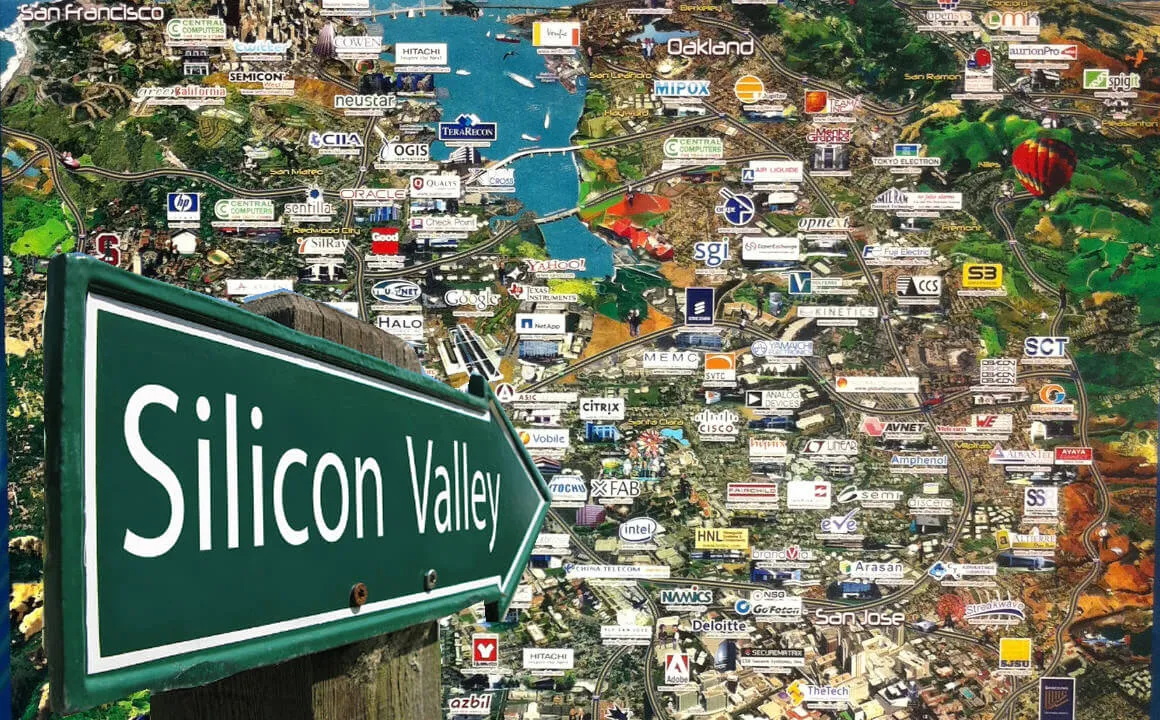
Silicon Valley is a region in the southern San Francisco Bay Area of Northern California that serves as a global center for high technology and innovation. It encompasses a number of cities and towns in Santa Clara and San Mateo counties, including San Jose, Sunnyvale, Santa Clara, Mountain View, Palo Alto, Menlo Park, Redwood City, and Cupertino.
The term "Silicon Valley" was first used in the 1970s to refer to the large number of silicon chip manufacturers in the region. Today, it is used more broadly to refer to the entire Bay Area technology industry, which includes companies in a wide range of fields, such as software, computer hardware, biotechnology, and venture capital.
Silicon Valley is home to some of the world's most successful and well-known technology companies, including Apple, Google, Facebook, Tesla, Oracle, Cisco, Hewlett-Packard, Intel, and eBay. The region is also home to a large number of startups and Venture Capital firms.
Silicon Valley is a major economic engine for the United States. The region's technology industry generates hundreds of billions of dollars in revenue each year and employs millions of people. Silicon Valley is also a major driver of innovation, and the region's companies are responsible for many of the technological breakthroughs that have changed the world in recent decades.
History
The history of Silicon Valley dates back to the early 20th century, when Stanford University became a major center for electrical engineering research. In the 1930s, a number of companies, such as Hewlett-Packard and Varian Associates, were founded in the area. After World War II, the region experienced a period of rapid growth, as the demand for electronics increased.
In the 1950s, the invention of the transistor led to the development of the silicon chip. This was a major breakthrough that made it possible to build smaller, more powerful computers. The development of the silicon chip led to the founding of a number of new companies in Silicon Valley, such as Intel and National Semiconductor.
In the 1960s and 1970s, Silicon Valley continued to grow as the demand for computers increased. The region was home to a number of important technological breakthroughs, such as the development of the microprocessor and the personal computer.
In the 1980s and 1990s, Silicon Valley experienced a period of explosive growth. The rise of the Internet led to the founding of a number of new companies, such as Google, Yahoo!, and eBay. The Dot-com Bubble of the late 1990s led to a burst in the technology industry, but Silicon Valley quickly recovered and continued to grow.
Today, Silicon Valley is the world's leading center for high technology and innovation. The region's companies are responsible for many of the technological breakthroughs that are changing the world, and they are sure to continue to play a major role in shaping the future.
In addition to its economic and technological significance, Silicon Valley is also a cultural phenomenon. The region's entrepreneurial spirit and its focus on innovation have inspired people around the world. Silicon Valley has been the subject of countless books, movies, and television shows, and it has become a symbol of the American Dream.
Silicon Valley Economy
The Silicon Valley economy is a fascinating and complex beast, fueled by innovation, talent, and venture capital. Here's a breakdown of its key characteristics:
Dominant Industry: Information Technology (IT) reigns supreme, encompassing high-tech giants like Google, Apple, and Meta, along with countless startups vying for the next big thing. These companies contribute significantly to the region's GDP and employment.
Knowledge-Based Workforce: Brainpower is the currency of Silicon Valley. Highly skilled engineers, programmers, entrepreneurs, and specialists form the backbone of the economy, attracting talent from around the world.
High-Growth and Volatility: Boom-and-bust cycles are inherent to the tech industry. Startups can see explosive growth or sudden demise, leading to constant reshuffling and dynamism within the landscape.
Venture Capital Ecosystem: A sophisticated network of VCs fuels innovation, providing startups with the funding they need to turn ideas into reality. This constant flow of capital creates a dynamic environment where risk-taking and experimentation are encouraged.
Inequality and Affordability: The vast wealth generated by the tech boom hasn't been evenly distributed. Housing costs have skyrocketed, pushing essential workers like teachers and service staff out of the region. This widening income gap and lack of affordable housing raise concerns about sustainability and social unrest.
Global Impact: Silicon Valley's innovations ripple across the globe, shaping industries, influencing trends, and impacting our daily lives. The technologies developed here can have both positive and negative consequences, sparking ongoing debates about ethics and responsible development.
Future Challenges: The future of Silicon Valley's economy faces challenges like changing political landscapes, rising global competition, and the need to address social inequities. Adaptability and a focus on ethical innovation will be crucial for continued success.
People Who Got Famous From Silicon Valley
Steve Jobs: Co-founder, chairman, and CEO of Apple Inc. Jobs is widely recognized as a pioneer of the personal computer industry and a cultural icon.
Larry Page and Sergey Brin: Co-founders of Google, Page and Brin are credited with developing the PageRank algorithm, which is the foundation of Google's search engine.
Mark Zuckerberg: Co-founder and CEO of Meta Platforms, Zuckerberg is one of the world's youngest billionaires and one of the most influential people in the world.
Elon Musk: CEO of Tesla, SpaceX, Neuralink, and The Boring Company, Musk is a serial entrepreneur and one of the most visionary figures in Silicon Valley.
Reed Hastings: Co-founder and CEO of Netflix, Hastings is one of the pioneers of the streaming media industry.
Jack Dorsey: Co-founder and CEO of Twitter and Block, Dorsey is a serial entrepreneur and one of the most influential figures in the social media industry.
Susan Wojcicki: CEO of YouTube, Wojcicki is one of the most powerful women in the tech industry
Jen-Hsun Huang: CEO of Nvidia, Huang is one of the leading figures in the graphics processing unit (GPU) industry.
